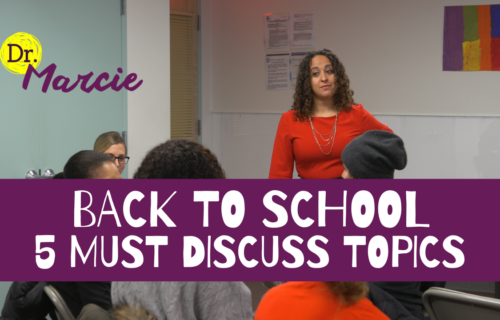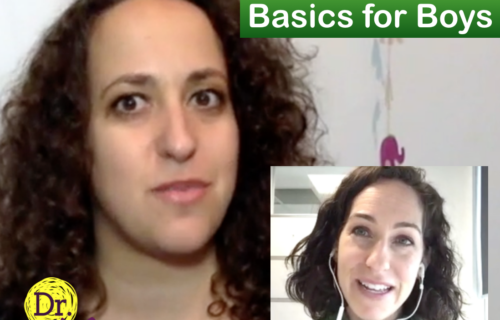
BITING IN THE CLASSROOM AND AT HOME
Dear Dr. Marcie,

I heard you speak at our professional development workshop. I have a young toddler — 14 months — who is biting in our classroom. I’ve assured the parents it is a typical behavior for her age and gave some reasons behind why she might be doing it: teething, changes at home, other friends in her space, lack of language to express her thoughts feelings and wishes. I also told the parents how we handle it in class (“biting hurts” and “It is not okay to bite.”) and how we give the child teethers to bite instead, sign language for the word “space”, and a preemptive warning in a positive tone, “That’s a nice kiss you’re giving your friend.” These things seem to be working so far. I was just wondering if you have any other behavioral tricks or resources we can share with parents.
From.
Head Teacher of The Infant Room
Here’s my answer:
Small beings bite, they simply do. Most often it’s not the big malicious move that big beings think it is. Small beings are exploring how to use their mouth, so the behavior is a way for them to do that and not necessarily a negative behavior.
Teaching them that it hurts others, however, is super important. Make sure to teach it like you would any other skill — with kindness and compassion.
When small beings are a little older — 2-5 years old — they may also be biting. Stay calm, there are a few different reasons for it.
1) They’re struggling to control their bodies. After all they’re still figuring out how it all works and when they get frustrated, biting might “accidentally” happen.
2) They get A LOT of attention for biting. So even though they know it is bad, they like the attention.
3) Your small being has learned that when they bite, they are left alone. Kids relinquish their toys and adults forget whatever demand they made.
Regardless of why your small being is biting or at what age here’s my top suggestion: Don’t give a huge reaction to it. (Tweet) I know it hurts (trust me I’ve been bitten my share of times), but stay as calm as you can. If you just asked your small being to share a toy, follow through and make sure the sharing happens. Acting like biting is not a big deal is critical for it to stop.
I’ve seen too many small beings bite and then a big being respond with, “No biting.” Saying that or talking about biting being bad does not change the behavior. Of course you want to impart that biting is not a good behavior, but it needs to done with actions and not words. Mostly, you need to teach your small being how to navigate their body without biting, so find a great replacement behavior, like stomping feet when frustrated or asking for attention with their words, and immediately start to teach that to your small being.
Creating motivation to stop biting will help. Start a bite-free reinforcement schedule and stick to it! This will increase your small being’s desire to pay attention to their bodies. It may take a lot of energy for them to control themselves, so make it worth their while. For instance, for every 30 minutes your small being doesn’t bite, give them five minutes of time alone with you. For every school day that they don’t bite, give them a special cookie on the way home from school.
If biting happens in front of other parents it can feel like a big deal, especially if your small being bit their small being. What to do? Immediately apologize to the other parents and offer an explanation. Do it with confidence and assurance that you’re handling it and teaching your small one that it’s not okay. If you make the apology all flustered or upset, then it gives space for the other parents to get upset. If you’re confident in dealing with the situation, the other parents are more likely to feel okay about the situation.
Ideas into Action!
Is your kid a biter? Make a plan for the next time he/she bites. What response will you give?
If your kid is not a bitter – think about how these techniques can apply to other situations. What are they?
Leave your feedback, experience and thoughts in the comment section below this post or email directly info@BehaviorAndBeyond.net with your behavior insights!
With a little help we can all grow. Keep checking in weekly for more parenting insights at Behavior and Beyond. For personal insights that I only share with my email list, please join my confidential email list below.



